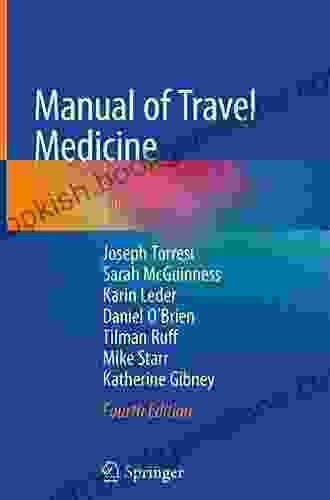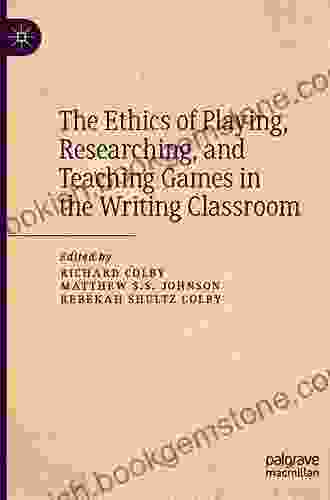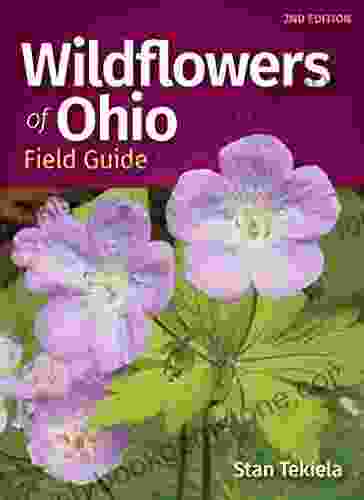The Ethics of Playing, Researching, and Teaching Games in the Writing Classroom

Games have become increasingly popular in the writing classroom in recent years. This is due in part to the growing body of research that suggests that games can be an effective tool for teaching writing skills. Games can provide students with opportunities to practice writing in a variety of contexts, to explore different writing styles, and to receive feedback from their peers and instructors.
5 out of 5
| Language | : | English |
| File size | : | 1976 KB |
| Text-to-Speech | : | Enabled |
| Screen Reader | : | Supported |
| Enhanced typesetting | : | Enabled |
| Word Wise | : | Enabled |
| Print length | : | 458 pages |
However, the use of games in the writing classroom also raises a number of ethical concerns. These concerns include the potential for games to be used to exploit students, to promote harmful stereotypes, and to create a hostile learning environment. It is important for educators to be aware of these ethical concerns and to take steps to mitigate them when using games in the classroom.
Potential Benefits of Using Games in the Writing Classroom
Games can offer a number of potential benefits for students in the writing classroom. These benefits include:
- Increased motivation: Games can be a motivating way for students to learn writing skills. When students are engaged in a game, they are more likely to be focused and attentive. This can lead to increased learning and retention.
- Improved writing skills: Games can help students to improve their writing skills in a variety of ways. For example, games can provide students with opportunities to practice writing in different contexts, to explore different writing styles, and to receive feedback from their peers and instructors.
- Enhanced creativity: Games can help students to develop their creativity. When students are playing a game, they are often required to think creatively and to come up with new ideas. This can lead to improved writing skills and a greater ability to express themselves creatively.
- Increased collaboration: Many games require students to work together in teams. This can help students to develop their collaboration skills and to learn how to work effectively with others.
- Reduced anxiety: Games can be a less stressful way for students to learn writing skills. When students are playing a game, they are not as focused on making mistakes. This can lead to reduced anxiety and a more positive learning experience.
Potential Risks of Using Games in the Writing Classroom
While games can offer a number of potential benefits for students in the writing classroom, there are also some potential risks to be aware of. These risks include:
- Exploitation: Games can be used to exploit students. For example, some games may require students to pay for in-game items or to purchase additional content. This can lead to financial exploitation of students and their families.
- Harmful stereotypes: Games can promote harmful stereotypes. For example, some games may portray women or people of color in a negative light. This can lead to students internalizing these stereotypes and perpetuating them in their own writing.
- Hostile learning environment: Games can create a hostile learning environment. For example, some games may contain violence, sexual content, or other inappropriate material. This can make students feel uncomfortable or unsafe in the classroom.
Ethical Guidelines for Using Games in the Writing Classroom
Given the potential benefits and risks of using games in the writing classroom, it is important for educators to use games in an ethical and responsible way. The following are some ethical guidelines for using games in the classroom:
- Choose games that are appropriate for the age and maturity level of your students. Games that are too difficult or too mature can be frustrating and discouraging for students. They may also be inappropriate for the classroom setting.
- Be aware of the potential for exploitation. Some games may require students to pay for in-game items or to purchase additional content. This can lead to financial exploitation of students and their families. Be sure to carefully review the game's terms of service before using it in the classroom.
- Be mindful of the potential for harmful stereotypes. Some games may portray women or people of color in a negative light. This can lead to students internalizing these stereotypes and perpetuating them in their own writing. Be sure to choose games that are inclusive and respectful of all students.
- Create a safe and supportive learning environment. Games should be used to create a safe and supportive learning environment for all students. Be sure to set clear rules and expectations for students when they are playing games. You should also be available to answer questions and to help students if they need it.
- Use games as a supplement to other teaching methods. Games should not be used as the sole method of teaching writing skills. They should be used as a supplement to other teaching methods, such as lectures, discussions, and writing workshops.
- Be reflective about your use of games. It is important to be reflective about your use of games in the writing classroom. Consider the impact that games are having on your students and make adjustments as needed.
Games can be a valuable tool for teaching writing skills in the classroom. However, it is important to be aware of the potential ethical concerns involved in using games. By following the ethical guidelines outlined in this article, educators can use games in a way that is beneficial for students and that promotes a safe and supportive learning environment.
5 out of 5
| Language | : | English |
| File size | : | 1976 KB |
| Text-to-Speech | : | Enabled |
| Screen Reader | : | Supported |
| Enhanced typesetting | : | Enabled |
| Word Wise | : | Enabled |
| Print length | : | 458 pages |
Do you want to contribute by writing guest posts on this blog?
Please contact us and send us a resume of previous articles that you have written.
 Best Book
Best Book Page Flip
Page Flip Bookshelf
Bookshelf Literary loom
Literary loom Chapter
Chapter Bookish
Bookish PageTurner
PageTurner Bibliophile
Bibliophile Story
Story Inkwell
Inkwell Bookworm
Bookworm Labyrinth
Labyrinth Plot Twist
Plot Twist Prose
Prose Paperback
Paperback Storyteller
Storyteller Sanctuary
Sanctuary Fiction
Fiction Reading
Reading Chronicle
Chronicle Read
Read Momtaz Begum Hossain
Momtaz Begum Hossain K Alex Walker
K Alex Walker Pauli Murray
Pauli Murray Nien Cheng
Nien Cheng Greg Gutfeld
Greg Gutfeld James Graham Baker
James Graham Baker Sally Blake
Sally Blake 1st Ed 2016 Edition
1st Ed 2016 Edition Sherri Granato
Sherri Granato Johno Ellison
Johno Ellison Joe R Lansdale
Joe R Lansdale Manifestation Publishing House
Manifestation Publishing House Julie Yip Williams
Julie Yip Williams Martin Gardner
Martin Gardner John Lewis Burckhardt
John Lewis Burckhardt Ken Budd
Ken Budd Luis Angel Echeverria
Luis Angel Echeverria Nancy Princenthal
Nancy Princenthal Korani Connolly
Korani Connolly Steven G Krantz
Steven G Krantz Mahi Wasfy
Mahi Wasfy Mike Joyce
Mike Joyce Tim Testu
Tim Testu Lindy Viandier
Lindy Viandier Marcus Samuelsson
Marcus Samuelsson Lian Quan Zhen
Lian Quan Zhen Steve Gordon Jr
Steve Gordon Jr Yuko Green
Yuko Green Marie Mutsuki Mockett
Marie Mutsuki Mockett Ashley Jaquavis
Ashley Jaquavis Meniere Man
Meniere Man Jeff Mellem
Jeff Mellem Kathy Cano Murillo
Kathy Cano Murillo Marcello Di Cintio
Marcello Di Cintio Megan Goldmine
Megan Goldmine Pero Tafur
Pero Tafur Oprah Winfrey
Oprah Winfrey Lauren Scruggs
Lauren Scruggs Miranda July
Miranda July David Batchelor
David Batchelor Philippa Ballantine
Philippa Ballantine Krystyna Chiger
Krystyna Chiger Kennedy Ryan
Kennedy Ryan K Wan
K Wan Patty Jansen
Patty Jansen Aer Ki Jyr
Aer Ki Jyr John L Turner
John L Turner Dave Brett
Dave Brett Naveed Rouhani
Naveed Rouhani Didier Ghez
Didier Ghez Tom Sito
Tom Sito Sawyer Black
Sawyer Black Nicole Casey
Nicole Casey James Hunter
James Hunter Tanya Talaga
Tanya Talaga Nisha Garg
Nisha Garg Paul A Moua
Paul A Moua Roger Cowell
Roger Cowell Lauren Graham
Lauren Graham Jessica Glasscock
Jessica Glasscock Stephanie Nicole Norris
Stephanie Nicole Norris William Hertling
William Hertling Michael Psellus
Michael Psellus Laura Lee Fritz
Laura Lee Fritz Mark Padilla
Mark Padilla W Somerset Maugham
W Somerset Maugham Charles Ney
Charles Ney Natalie Hodges
Natalie Hodges Daniel Schinhofen
Daniel Schinhofen Blair Davis
Blair Davis Delphi Classics
Delphi Classics Paul Noble
Paul Noble Joseph Toone
Joseph Toone Manuel Huitzilli
Manuel Huitzilli Marcy Conway
Marcy Conway Mau Kun Yim
Mau Kun Yim Nadia Owusu
Nadia Owusu John Donohue
John Donohue Stephanie Mehta
Stephanie Mehta Violet Ramis Stiel
Violet Ramis Stiel Philip Lee
Philip Lee Joy Horowitz
Joy Horowitz Philip Ball
Philip Ball Maureen Hughes
Maureen Hughes Manuel Lima
Manuel Lima Jonathan Clements
Jonathan Clements Katy Sprinkel
Katy Sprinkel Jeff W Bens
Jeff W Bens Sarah Abrevaya Stein
Sarah Abrevaya Stein Marcelo Hernandez Castillo
Marcelo Hernandez Castillo Sue Black
Sue Black Andre Henry
Andre Henry Nolan Clark
Nolan Clark Julie Beemer
Julie Beemer Rosalind K Marshall
Rosalind K Marshall Jl Seegars
Jl Seegars Ping Fu
Ping Fu Norman M Shulman
Norman M Shulman Patrice Gopo
Patrice Gopo Peter L Phillips
Peter L Phillips Bill Rumpel
Bill Rumpel Saul Tanpepper
Saul Tanpepper Steve Glassman
Steve Glassman Marlena De Blasi
Marlena De Blasi Nick Axel
Nick Axel Ilana Benady
Ilana Benady Scape Martinez
Scape Martinez Michael A Hoey
Michael A Hoey Tim Anderson
Tim Anderson Sonja B
Sonja B Neil Fontaine
Neil Fontaine Robin Rainbow Gate
Robin Rainbow Gate Molly Bang
Molly Bang Mary Beard
Mary Beard Bill Arnott
Bill Arnott Ruby Dixon
Ruby Dixon Patti Bellantoni
Patti Bellantoni Lincoln Michel
Lincoln Michel Martina Carracedo
Martina Carracedo Peter Mayle
Peter Mayle Skip Mort
Skip Mort Jesse Thistle
Jesse Thistle Elliot Beier
Elliot Beier Lisa Congdon
Lisa Congdon Jenny Lawson
Jenny Lawson James Ernest Shaw
James Ernest Shaw Miriam Giguere
Miriam Giguere Shani Greene Dowdell
Shani Greene Dowdell Jason A Ramos
Jason A Ramos Richard Feinberg
Richard Feinberg N K Jemisin
N K Jemisin Rayna Denison
Rayna Denison Russ Howard
Russ Howard Tammy Ruggles
Tammy Ruggles Wesley Gardner
Wesley Gardner Talk In Italian
Talk In Italian Kristina Mcmorris
Kristina Mcmorris Karl Ove Knausgaard
Karl Ove Knausgaard Noah Hurowitz
Noah Hurowitz M A Rothman
M A Rothman John Dvorak
John Dvorak Joan Breton Connelly
Joan Breton Connelly Tova Rabinowitz
Tova Rabinowitz Nathan Mccall
Nathan Mccall Priscilla Batzell
Priscilla Batzell Katie Dowe
Katie Dowe Baratunde Thurston
Baratunde Thurston Yatir Nitzany
Yatir Nitzany Wallace Terry
Wallace Terry Shelly Kim
Shelly Kim Will Jawando
Will Jawando John Fabian Carlson
John Fabian Carlson Jonathan Smidt
Jonathan Smidt Paul Seydor
Paul Seydor Larry Taylor
Larry Taylor Tim Gallagher
Tim Gallagher Norman Bryson
Norman Bryson Robert Henri
Robert Henri Robert Evans
Robert Evans Mimi Thorisson
Mimi Thorisson Yuniya Kawamura
Yuniya Kawamura Calum Best
Calum Best Kerry Bogert
Kerry Bogert Kelcey Coe
Kelcey Coe William Lidwell
William Lidwell Liz Hurley
Liz Hurley Karen Lewis
Karen Lewis Kevin Henry
Kevin Henry Grace Lee Boggs
Grace Lee Boggs Lauren Beukes
Lauren Beukes Liz Scheier
Liz Scheier Janice Tingum
Janice Tingum Phoenix Grey
Phoenix Grey Nicholas Wapshott
Nicholas Wapshott Jeff Shaara
Jeff Shaara Elle Wright
Elle Wright Tamsin Ley
Tamsin Ley William Alexander Percy
William Alexander Percy Clara Nieto
Clara Nieto William W Johnstone
William W Johnstone Mariko Higaki
Mariko Higaki Nicholas Sparks
Nicholas Sparks William C Cline
William C Cline Pamela Cutter
Pamela Cutter Mark C Childs
Mark C Childs Donald J Trump
Donald J Trump Burst Books
Burst Books Ronald Bergan
Ronald Bergan Megan Carr
Megan Carr Eamon Evans
Eamon Evans Eliot Schrefer
Eliot Schrefer Nathan Riley
Nathan Riley Kate Bryan
Kate Bryan Tim Moss
Tim Moss Madhushree Ghosh
Madhushree Ghosh Miriam F Williams
Miriam F Williams Joel Sonnenberg
Joel Sonnenberg Sharmila Sen
Sharmila Sen Peter Bone
Peter Bone Platte Productions Llc
Platte Productions Llc Russell Zimmerman
Russell Zimmerman Mike Lowery
Mike Lowery Megan Wells
Megan Wells Print Replica Kindle Edition
Print Replica Kindle Edition Sharon Mckee
Sharon Mckee Kitty Williams
Kitty Williams John Wesley Powell
John Wesley Powell Mary Boone
Mary Boone Margaret C Collier
Margaret C Collier Luke Chmilenko
Luke Chmilenko Anne Manera
Anne Manera Christopher Reeve
Christopher Reeve Mary M Lane
Mary M Lane Joshua James
Joshua James Daniel Silva
Daniel Silva Ben Box
Ben Box Odie Hawkins
Odie Hawkins Javy Lopez
Javy Lopez Liz Chaderton
Liz Chaderton Sean Robins
Sean Robins Phil Cleaver
Phil Cleaver Megan Marshall
Megan Marshall Chika Okeke Agulu
Chika Okeke Agulu Mary Carolyn Waldrep
Mary Carolyn Waldrep Larisa Golubeva
Larisa Golubeva Richard Ross
Richard Ross Nic Oatridge
Nic Oatridge W David Baird
W David Baird Kindle Edition
Kindle Edition Norman Lebrecht
Norman Lebrecht Bwwm Club
Bwwm Club Lorrie Morocha
Lorrie Morocha Kathleen Smith
Kathleen Smith Robyn Carr
Robyn Carr Randi Minetor
Randi Minetor Paolo Bacigalupi
Paolo Bacigalupi Victoria Rivera Mckinley
Victoria Rivera Mckinley Michael Smith
Michael Smith Matthew Hahn
Matthew Hahn Richard W Pointer
Richard W Pointer Jerzy Kosinski
Jerzy Kosinski Scott David Plumlee
Scott David Plumlee Brenda Lyons
Brenda Lyons Milind Mulick
Milind Mulick Julian Rothenstein
Julian Rothenstein Molly Haskell
Molly Haskell Jo Thomas
Jo Thomas Ellis Cose
Ellis Cose Julia Walker
Julia Walker John Davidson
John Davidson Robert B Parker
Robert B Parker Ketut Suasti
Ketut Suasti Monica L Miller
Monica L Miller Rajat Gupta
Rajat Gupta W R Tymms
W R Tymms Nicki Thornton
Nicki Thornton Patrick Drazen
Patrick Drazen Tricia Rose
Tricia Rose Monica Huerta
Monica Huerta Sosha Davis
Sosha Davis Renia Spiegel
Renia Spiegel Paul Strathern
Paul Strathern Andrew Cunningham
Andrew Cunningham Tonya Burrows
Tonya Burrows Joann Perahia
Joann Perahia K C Mills
K C Mills Laird Barron
Laird Barron Taniela Tabu
Taniela Tabu Kenan Trebincevic
Kenan Trebincevic Lara Quaranta
Lara Quaranta Azim Nanji
Azim Nanji Mark Odegard
Mark Odegard Bernadette Simpson
Bernadette Simpson W Kamau Bell
W Kamau Bell Samra Habib
Samra Habib Yelapa Memo
Yelapa Memo Philip K Dick
Philip K Dick Scott Brown
Scott Brown Lewis Smile
Lewis Smile Kim Barker
Kim Barker Giovanni Iannoni
Giovanni Iannoni Tapirus
Tapirus Mariam Elias
Mariam Elias Ed Gillis
Ed Gillis Jean Guerrero
Jean Guerrero Travis Bagwell
Travis Bagwell Vivian Gibson
Vivian Gibson Bob Santos
Bob Santos Dean Koontz
Dean Koontz Taylor Mason
Taylor Mason William L Fox
William L Fox Lynn Garafola
Lynn Garafola Kim Kavin
Kim Kavin Emma Dabiri
Emma Dabiri Robert Finch
Robert Finch Michael Oher
Michael Oher Tom Sterling
Tom Sterling Steven W Naifeh
Steven W Naifeh Shani Mootoo
Shani Mootoo Mayukh Sen
Mayukh Sen Martha Hall Kelly
Martha Hall Kelly Jim Forest
Jim Forest Xander Boyce
Xander Boyce Vaughn Heppner
Vaughn Heppner Mary Matsuda Gruenewald
Mary Matsuda Gruenewald Tim Severin
Tim Severin Keiko Okamoto
Keiko Okamoto Kassia St Clair
Kassia St Clair Matt Patterson
Matt Patterson Rosayra Pablo Cruz
Rosayra Pablo Cruz William Gibson
William Gibson Julia Child
Julia Child Richard Lippe
Richard Lippe Roger Zelazny
Roger Zelazny Tim Wootton
Tim Wootton Joseph Johnson
Joseph Johnson Stephen Coles
Stephen Coles Carly Murden
Carly Murden Tanja Jung
Tanja Jung Russell Means
Russell Means Alicia Beckton
Alicia Beckton Steven Skaggs
Steven Skaggs S L Osborne
S L Osborne Thibault Ehrengardt
Thibault Ehrengardt Kale James
Kale James Kay Redfield Jamison
Kay Redfield Jamison Daniel Gibbs
Daniel Gibbs Neal Adams
Neal Adams Matthew Stavros
Matthew Stavros 1st Ed 2018 Edition Kindle Edition
1st Ed 2018 Edition Kindle Edition Alyssa Campbell
Alyssa Campbell Margo Bond Collins
Margo Bond Collins Patrick Mcgilligan
Patrick Mcgilligan Honesty Price
Honesty Price Kathryn Aalto
Kathryn Aalto Kristin Harmel
Kristin Harmel Niobia Bryant
Niobia Bryant Kyriacos C Markides
Kyriacos C Markides Robert M Goldstein
Robert M Goldstein Ton Viet Ta
Ton Viet Ta Karma Waltonen
Karma Waltonen Deborah Willis
Deborah Willis John Paul Stonard
John Paul Stonard Ruth Reichl
Ruth Reichl Philip Stewart
Philip Stewart Myrnoska Scott
Myrnoska Scott Richard D Fisher
Richard D Fisher Deborah Fallows
Deborah Fallows Marie Louise Gay
Marie Louise Gay Jodi Bombardier
Jodi Bombardier Sarah Valentine
Sarah Valentine Sam Shepard
Sam Shepard William Evans
William Evans Margo Jefferson
Margo Jefferson Christopher Lane
Christopher Lane Jubilee Brown
Jubilee Brown Joyce Huber
Joyce Huber Tyora Moody
Tyora Moody Hope Edelman
Hope Edelman Lucy Moore
Lucy Moore William Carroll
William Carroll Rough Guides
Rough Guides Jonah Mcdonald
Jonah Mcdonald Sonja Mejcher Atassi
Sonja Mejcher Atassi Akire C
Akire C Neal Stephenson
Neal Stephenson Lisa Brahin
Lisa Brahin Katherine Le Kang
Katherine Le Kang Jim Santos
Jim Santos Lou Darvas
Lou Darvas Margaret Eggleton
Margaret Eggleton Manny Serrato
Manny Serrato Sergio Toppi
Sergio Toppi Rebecca Kobrin
Rebecca Kobrin Richard Fleischer
Richard Fleischer Candice Marie Benbow
Candice Marie Benbow Sally J Pla
Sally J Pla Patrice Pavis
Patrice Pavis Robert Gottlieb
Robert Gottlieb Shaka Senghor
Shaka Senghor Stefan Pabst
Stefan Pabst Tom Fay
Tom Fay Daniel James Brown
Daniel James Brown Simona Merchant Dest
Simona Merchant Dest Miranda Bridges
Miranda Bridges Nick Barratt
Nick Barratt Sharon Stone
Sharon Stone S G Seabourne
S G Seabourne Yuliia Pozniak
Yuliia Pozniak William Shatner
William Shatner Shemer Kuznits
Shemer Kuznits Renee Rose
Renee Rose Marcos Mateu Mestre
Marcos Mateu Mestre Lisa See
Lisa See David J Schmidt
David J Schmidt Joel Shepherd
Joel Shepherd Mladen Sutej
Mladen Sutej Yishan Li
Yishan Li Sheila Watt Cloutier
Sheila Watt Cloutier Lily Fulop
Lily Fulop Requiem Scolopendra
Requiem Scolopendra Laurinda Reddig
Laurinda Reddig David Baldacci
David Baldacci Cathy Johnson
Cathy Johnson Maria Morera Johnson
Maria Morera Johnson Klas Kristiansson
Klas Kristiansson Ward Eister
Ward Eister W Glenn Griffin
W Glenn Griffin Rebecca Roanhorse
Rebecca Roanhorse Mark Strand
Mark Strand Kathy Valentine
Kathy Valentine Michelle Jackson
Michelle Jackson Tasha Black
Tasha Black Deaver Brown
Deaver Brown Steve Stevenson
Steve Stevenson Tony Morgan
Tony Morgan Jennifer Wright
Jennifer Wright David Kadavy
David Kadavy Katharine Branning
Katharine Branning Kelly Gay
Kelly Gay Kimberly Smith
Kimberly Smith Stephen Kirkpatrick
Stephen Kirkpatrick Michael Friel
Michael Friel Patrick Herrendorf
Patrick Herrendorf Sonia Moore
Sonia Moore M C Roberts
M C Roberts Loung Ung
Loung Ung Michael R Jackson
Michael R Jackson Johanna Lehner
Johanna Lehner Julia Fowler
Julia Fowler Anne H Berry
Anne H Berry Simon R Green
Simon R Green Jonathan D Sarna
Jonathan D Sarna Timothy S Susanin
Timothy S Susanin Letitia Shelton
Letitia Shelton Regine Abel
Regine Abel Reginald F Lewis
Reginald F Lewis Robin Hobb
Robin Hobb Caroline Eden
Caroline Eden Toni Morrison
Toni Morrison Sherryl Woods
Sherryl Woods Dan X Solo
Dan X Solo Jessica Garrison
Jessica Garrison Julia Summerfield
Julia Summerfield Linda Rodriguez Mcrobbie
Linda Rodriguez Mcrobbie Plutarch
Plutarch Richard Paul Russo
Richard Paul Russo Dakota Krout
Dakota Krout Silvana Paternostro
Silvana Paternostro Mary Stuart
Mary Stuart Mary Heron Dyer
Mary Heron Dyer Joseph Beuys
Joseph Beuys Paige R Penland
Paige R Penland Kenneth Laws
Kenneth Laws Derek Baxter
Derek Baxter Ulrike Fuchs
Ulrike Fuchs Learning Through Play
Learning Through Play Marc Cameron
Marc Cameron Tony Walsh
Tony Walsh Svetlana Quindt
Svetlana Quindt Rem Koolhaas
Rem Koolhaas John Muir
John Muir Timothy Brook
Timothy Brook Stephen Saad
Stephen Saad John Carey Cremony
John Carey Cremony Paula Henriksen
Paula Henriksen 1st Ed 2021 Edition Kindle Edition
1st Ed 2021 Edition Kindle Edition John Thompson
John Thompson Joe Kuster
Joe Kuster Graham Rowley
Graham Rowley Matt Gilbert
Matt Gilbert Ryan Roenfeld
Ryan Roenfeld Tom Brosnahan
Tom Brosnahan Kayla Watkins
Kayla Watkins Sally Howard
Sally Howard Kim Catron
Kim Catron Kenneth Ma
Kenneth Ma David Roberts
David Roberts Sian Pritchard Jones
Sian Pritchard Jones Nicole Pivirotto
Nicole Pivirotto Brian Kevin
Brian Kevin Francis Tipene
Francis Tipene Robert Rummel Hudson
Robert Rummel Hudson Donna Williams
Donna Williams Nik Mahon
Nik Mahon Omar Sharif Jr
Omar Sharif Jr Various
Various Katherine Addison
Katherine Addison T Stonefield
T Stonefield I C Robledo
I C Robledo Linda Keteyian
Linda Keteyian James Mcbride
James Mcbride Meredith Dillman
Meredith Dillman Paul Greenhalgh
Paul Greenhalgh 1st Ed 2019 Edition Kindle Edition
1st Ed 2019 Edition Kindle Edition Kindle Comixology
Kindle Comixology Cath Caldwell
Cath Caldwell Jenny Bowen
Jenny Bowen Tom Larcombe
Tom Larcombe Stephen King
Stephen King Shlomo Avineri
Shlomo Avineri Jessica Fanigliulo
Jessica Fanigliulo Reanne Hemingway Douglass
Reanne Hemingway Douglass Will Stovall
Will Stovall Steve Alpert
Steve Alpert 1st Ed 2020 Edition Kindle Edition
1st Ed 2020 Edition Kindle Edition Pilar M Herr
Pilar M Herr Tracy Lash Decrosta
Tracy Lash Decrosta Insight Guides
Insight Guides Robert Macklin
Robert Macklin Roland L Mcintosh
Roland L Mcintosh Richard J Powell
Richard J Powell Kristina Harris
Kristina Harris Tiya Rayne
Tiya Rayne Victor Steffensen
Victor Steffensen David Cummings
David Cummings Richard Fidler
Richard Fidler Christopher Reutinger
Christopher Reutinger Richard Butner
Richard Butner Graeme Swann
Graeme Swann Malcolm C Salaman
Malcolm C Salaman David Hopkins
David Hopkins Neil Bimbeau
Neil Bimbeau Shelley Shepard Gray
Shelley Shepard Gray Richard S Dunn
Richard S Dunn Ursa Dax
Ursa Dax Magdalena Matulewicz
Magdalena Matulewicz Nikita Thorn
Nikita Thorn Stuart Douglas
Stuart Douglas Zondervan
Zondervan James J Downes
James J Downes Bernth Lindfors
Bernth Lindfors Sister Souljah
Sister Souljah Mimi Grace
Mimi Grace Judy Bolton Fasman
Judy Bolton Fasman David Paleschuck
David Paleschuck Paul Thimou
Paul Thimou Vladimir Geroimenko
Vladimir Geroimenko John Pomfret
John Pomfret Mike Grist
Mike Grist Dk Eyewitness
Dk Eyewitness Tom Cotter
Tom Cotter Kait Fennell
Kait Fennell Ryan Dempsey
Ryan Dempsey Kim Hutchinson
Kim Hutchinson Ruben Gallego
Ruben Gallego James Hall
James Hall 1st Edition Kindle Edition
1st Edition Kindle Edition Usman Zafar Paracha
Usman Zafar Paracha Carl E Schorske
Carl E Schorske Diane Chamberlain
Diane Chamberlain Q David Bowers
Q David Bowers Julian May
Julian May Helm Wotzkow
Helm Wotzkow Veronica G Henry
Veronica G Henry Steve Van Beek
Steve Van Beek Kamal Saleem
Kamal Saleem Christian Blauvelt
Christian Blauvelt Vicki Rozema
Vicki Rozema Oscar Owen
Oscar Owen Mary Breu
Mary Breu Rachel Shirley
Rachel Shirley David S Luton
David S Luton Rick Goldschmidt
Rick Goldschmidt Ted Bell
Ted Bell Warren Dotz
Warren Dotz Theo Hodges
Theo Hodges Trevor Carroll
Trevor Carroll Bruce Spydar
Bruce Spydar Trova Heffernan
Trova Heffernan Marteeka Karland
Marteeka Karland Raquel Cepeda
Raquel Cepeda Louis L Amour
Louis L Amour Jerry Saltz
Jerry Saltz Richard Matheson
Richard Matheson Steve Cohen
Steve Cohen Victoria Charles
Victoria Charles John Wyndham
John Wyndham Robbie Quinn
Robbie Quinn Robert Knott
Robert Knott Sam Crescent
Sam Crescent Connie Easton
Connie Easton Rosemary Mahoney
Rosemary Mahoney Sangeeta Prasad
Sangeeta Prasad Alan R Hauser
Alan R Hauser Joyce Roa
Joyce Roa Leo W Chang
Leo W Chang Luis J Rodriguez
Luis J Rodriguez Charles B Gatewood
Charles B Gatewood Svenja Reidelbach
Svenja Reidelbach Suzanne Fredericq
Suzanne Fredericq Kagan Mcleod
Kagan Mcleod Mick Huerta
Mick Huerta Tricia Martineau Wagner
Tricia Martineau Wagner Breanna De Shay
Breanna De Shay Vincent Van Gogh
Vincent Van Gogh Shaopeng Chen
Shaopeng Chen Paul Chiasson
Paul Chiasson Matthew Bourne
Matthew Bourne Stan Tekiela
Stan Tekiela Mark T Conard
Mark T Conard Harold Green Iii
Harold Green Iii Patty A Wilson
Patty A Wilson Lisa Maker
Lisa Maker Kathy Barnette
Kathy Barnette Walter Mosley
Walter Mosley Regina Clarke
Regina Clarke Ari Goldberg
Ari Goldberg Katie Middleton
Katie Middleton Joel Stratte Mcclure
Joel Stratte Mcclure Joseph Judson Dimock
Joseph Judson Dimock Nia Arthurs
Nia Arthurs Diana Kupershmit
Diana Kupershmit Tobias Zimmermann
Tobias Zimmermann Vic Shayne
Vic Shayne Sonia Faleiro
Sonia Faleiro Sesali Bowen
Sesali Bowen Jon Contino
Jon Contino Matthew Israel
Matthew Israel Daniel Connolly
Daniel Connolly Emily Byrne Curtis
Emily Byrne Curtis Pat Dews
Pat Dews Meir Shalev
Meir Shalev Tony Dungy
Tony Dungy Marianna Leivaditaki
Marianna Leivaditaki William R Forstchen
William R Forstchen Lesley Riley
Lesley Riley Richard Delacy
Richard Delacy Holly Madison
Holly Madison Laylah Roberts
Laylah Roberts Michael F Steltenkamp
Michael F Steltenkamp Mark Lane
Mark Lane Laura Reiter
Laura Reiter Don Peri
Don Peri Maria Augusta Trapp
Maria Augusta Trapp Sarah Vallance
Sarah Vallance Wes Hubert
Wes Hubert Graham Cole
Graham Cole Vowron Prime
Vowron Prime Duncan James
Duncan James Lisa Smith
Lisa Smith Sean Platt
Sean Platt
Light bulbAdvertise smarter! Our strategic ad space ensures maximum exposure. Reserve your spot today!

 Mark MitchellA Thrilling Odyssey: The Personal Narrative of the Discovery of the Northwest...
Mark MitchellA Thrilling Odyssey: The Personal Narrative of the Discovery of the Northwest...
 Maurice ParkerPath of the Dragon Mage: A Literary Odyssey into the Realm of Fantasy and...
Maurice ParkerPath of the Dragon Mage: A Literary Odyssey into the Realm of Fantasy and...
 Roberto BolañoThe Ultimate Guide to Travel Medicine: A Comprehensive Review of Manual of...
Roberto BolañoThe Ultimate Guide to Travel Medicine: A Comprehensive Review of Manual of... Trevor BellFollow ·18k
Trevor BellFollow ·18k Chris ColemanFollow ·11.7k
Chris ColemanFollow ·11.7k Colby CoxFollow ·16.9k
Colby CoxFollow ·16.9k Brandon CoxFollow ·16.1k
Brandon CoxFollow ·16.1k Samuel BeckettFollow ·5.4k
Samuel BeckettFollow ·5.4k John UpdikeFollow ·10.1k
John UpdikeFollow ·10.1k Edward BellFollow ·19.4k
Edward BellFollow ·19.4k J.D. SalingerFollow ·10.5k
J.D. SalingerFollow ·10.5k

 Marvin Hayes
Marvin HayesBarn Find Road Trip: Unearthing Hidden Automotive...
In the realm of automotive...

 Griffin Mitchell
Griffin MitchellWorkbook for Bessel van der Kolk's "The Body Keeps the...
Trauma is a pervasive issue that affects...

 Kevin Turner
Kevin TurnerExploring the Enchanting Islands of Puerto Rico:...
Embark on an...

 Mike Hayes
Mike HayesDiscover Santa Fe's Enchanting Charm with the DK...
Nestled at the foot of the...

 Colby Cox
Colby CoxConversational Arabic Quick and Easy: Yemeni Arabic...
Welcome to the exciting...

 Davion Powell
Davion PowellNative Labor in the Pacific World: A Comprehensive...
The Pacific World, encompassing the vast...
5 out of 5
| Language | : | English |
| File size | : | 1976 KB |
| Text-to-Speech | : | Enabled |
| Screen Reader | : | Supported |
| Enhanced typesetting | : | Enabled |
| Word Wise | : | Enabled |
| Print length | : | 458 pages |






